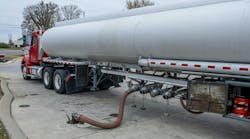The American Trucking Assns. (ATA) has adopted a carbon emissions control policy platform that identifies fuel economy standards as the preferred method to reducing emissions.
The policy, part of the organization’s sustainability platform, states that setting fuel economy standards is preferable to government actions that would set alternative fuel mandates or other policies that would increase fuel prices.
“Carbon emission reductions achieved through national truck fuel economy standards are preferable to government actions that increase fuel prices in an effort to discourage petroleum-based diesel fuel consumption or mandate the use of alternative fuels,” ATA said.
ATA’s new energy policy outlines a framework for evaluating carbon-control initiatives and specifies that an effective carbon-control program for the trucking industry must address the following provisions:
- Produce cost-effective, verifiable carbon reductions;
- Ensure that revenue generated from motor carriers and other highway transportation consumers benefits highway users;
- Ensure that any increased costs are reasonable, predictable and do not increase the volatility of fuel prices;
- Avoid diesel fuel supply disruptions and ensure that only on-road diesel fuel that meets the ASTM standard for which trucks were designed to run on is sold in the marketplace;
- Maintain a level playing field among freight transportation modes;
- Provides incentives for improved fuel efficiency and availability of alternative technologies.
“Diesel fuel remains the most viable option for powering the trucking industry,” said ATA vice president Rich Moskowitz. “ATA’s carbon emission reduction policy acknowledges the need to look toward alternative technologies while ensuring that the industry can continue to efficiently move the consumer goods we rely on daily.”
The carbon emissions policies were approved by the ATA Board of Directors at the association’s Management Conference & Exhibition, held Oct. 16-19 in Phoenix.
Visit www.trucksdeliver.org for more information about ATA’s sustainability recommendations.


